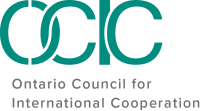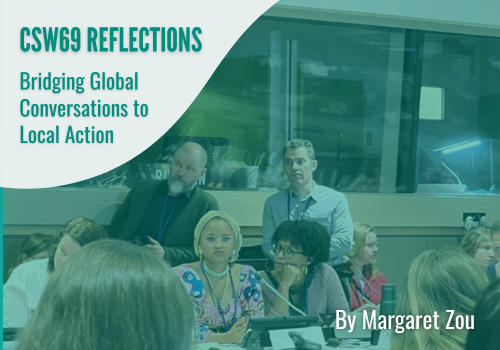CSW69 Reflection: Bridging Global Conversations to Local Action
Margaret Zou | March 19, 2025
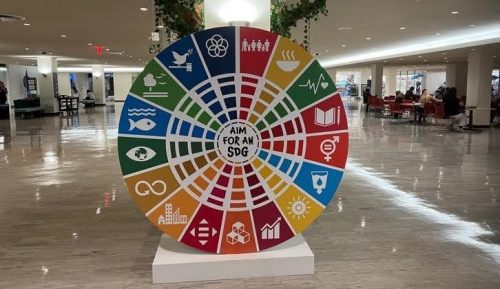
For the past few years, Kawartha World Issues Centre (KWIC) has been working on localizing the Sustainable Development Goals (SDGs) in Nogojiwanong | Peterborough. We hosted several community forums in collaboration with community partners to advance and localize the SDGs, centering Indigenous leadership and ensuring no one is left behind. In these discussions, we focused on several key SDGs that are relevant locally. Most recently, our work has shifted towards SDG 3 (Good Health and Well-being), SDG 5 (Gender Equality), and SDG 13 (Climate Action), building on our previous work. We are able to deepen our impact, strengthen community engagement, and drive meaningful action towards a more sustainable future.
As part of our commitment to advancing the SDGs and amplifying local voices on global platforms, we had the opportunity to attend the 69th session of the Commission on the Status of Women (CSW 69). This experience builds on our ongoing efforts to localize the SDGs in Nogojiwanong | Peterborough, particularly our focus on SDG 3 (Good Health and Well-being), SDG 5 (Gender Equality), and SDG 13 (Climate Action). Below are some key highlights and takeaways from the side event sessions, along with their alignment to KWIC’s mission!
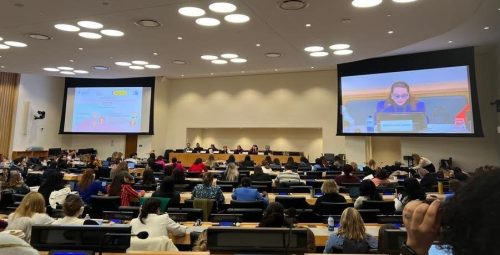
Session: 30 Years of Women’s Political Participation: Towards Full Parity
Key takeaways:
- Comprehensive legislation is essential to defend women’s rights, reduce the salary gap, and support their entry into the labor market.
- Achieving gender equality requires more than just legislative action-it requires a “broad social consensus.”
- Women’s participation in all levels of government is crucial for creating policies that reflect the needs and interests of society.
Connecting to KWIC’s work:
KWIC’s Advancing Gender Equality project engaged women and gender diverse people in workshop discussions to share their stories, creating a living community map of gender equality assets. These workshops also educated participants on national and global contexts of gender equality.
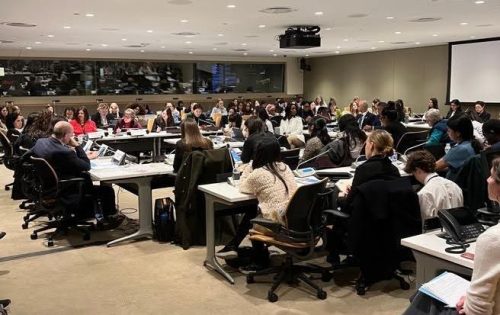
Session: No Gender Equality Without Women’s Health: Centering the Health of Women and Girls 30 Years after Beijing
Key takeaways:
- Despite significant advances in women’s health and greater equality for women and girls than ever before, setbacks in rights and slow progress mean that the goals of the Beijing Declaration are slipping away.
- In 1995, the world made a bold promise: women’s rights are human rights. The Beijing Declaration and Platform for Action recognized women’s health as a critical area and provided a blueprint for women and girls’ access to quality health care.
- We must collaborate to take action and develop a radical new approach to delivering healthcare for women.
Connecting to KWIC’s work:
Every year, KWIC and Kawartha Sexual Assault Centre (KSAC) in collabortation with their community partners host the annual International Women’s Day event in Nogojiwanong/Peterborough, bringing together the community to celebrate the day with speakers and a rally. This year’s theme, ‘Accelerate Action’, highlights the urgent need to accelerate progress, as current rates suggest that full gender parity won’t be achieved until 2158.
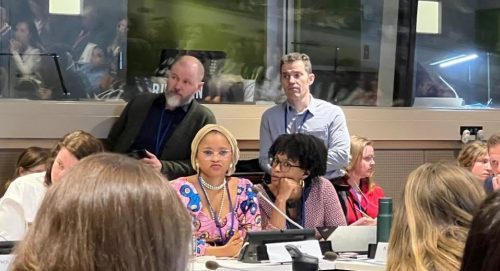
Session: Digital Solution for Gender Equality and SRHR
Key takeaways:
- While digital solutions/spaces are important, young people also need “human solutions/spaces” to talk and exchange information on SRHR.
- WHO is currently combating misinformation through social media listening, trend analysis, and media collaboration. Adding “sprinkles” to baseline content can tailor the information and gain more traction on social media
- Bridging the digital divide that persists in some communities will require multiple solutions, including training advocates to create a ripple effect and empowering community leaders to take action.
Connecting to KWIC’s work:
KWIC’s Climate Kinship project mirrors this movement in a different space, emphasizing intergenerational collaboration in climate advocacy. The project aims to bridge generations for climate action by fostering one-one mentorship connections and knowledge exchange between seniors and youth in the local community.
 Margaret Zou
Margaret Zou
Executive Director of Kawartha World Issues Centre (KWIC) & OCIC CSW69 Delegate
Margaret (she/her) holds a BScH in Life Sciences from Queen’s University, an MSc in Environmental Management and Assessment from the University of Liverpool, and an MPH in Environmental Health from the London School of Hygiene and Tropical Medicine (LSHTM). Her policy interests lay at the intersection of environmental and human health, gender equity, and anything climate related.
